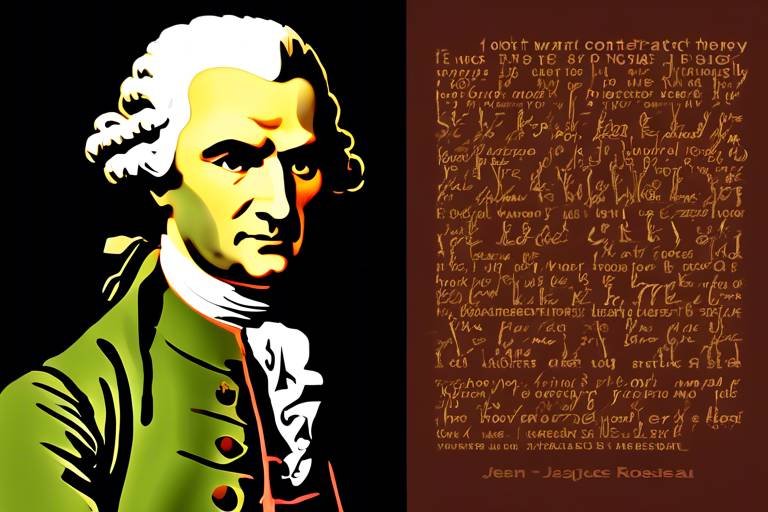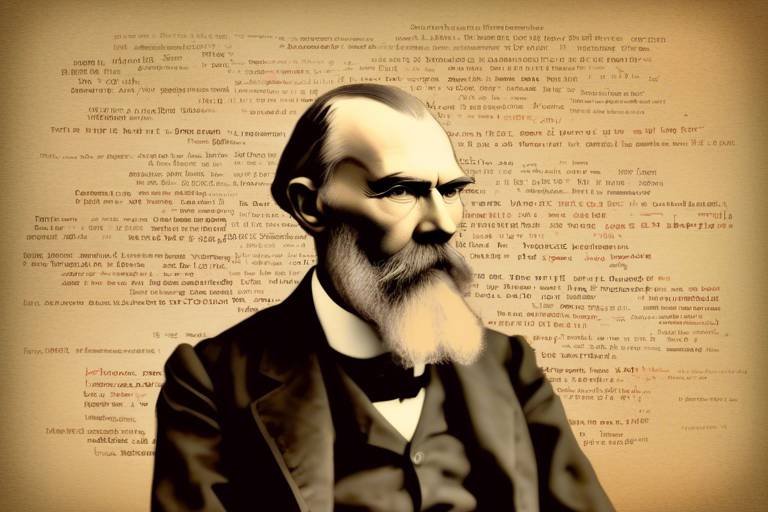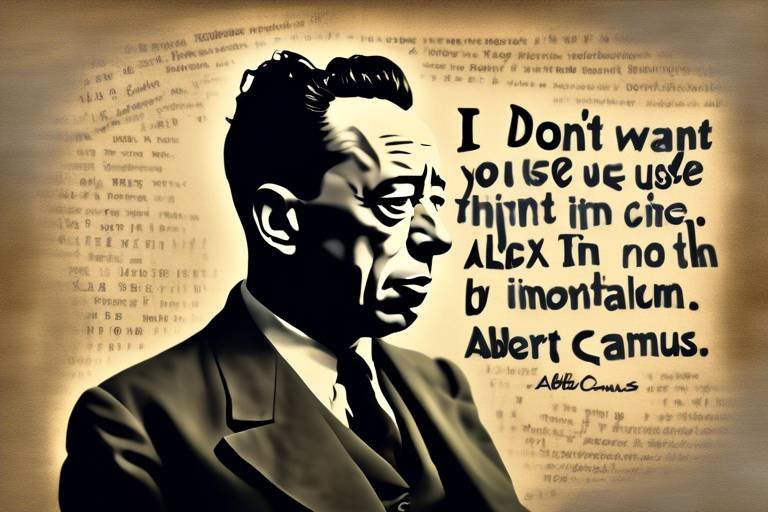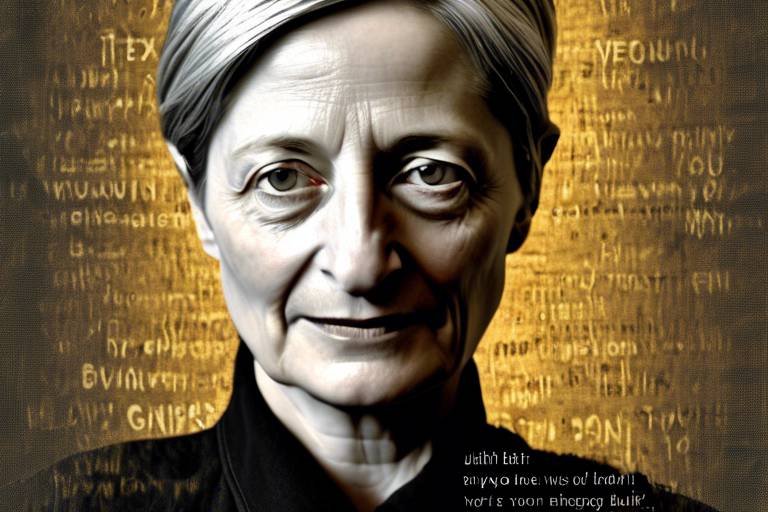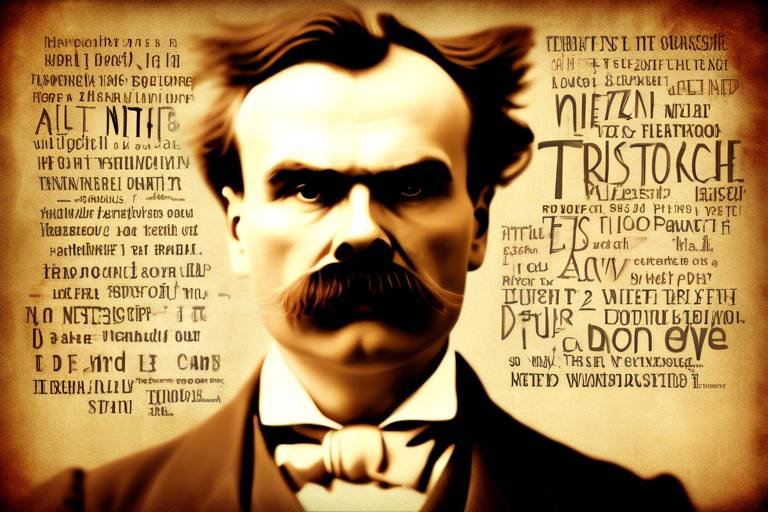What Makes Henri Bergson's Concept of Time Unique?
Henri Bergson, a French philosopher of the late 19th and early 20th centuries, revolutionized our understanding of time with his unique perspective that diverges sharply from traditional, mechanistic views. While most people think of time as a linear, quantifiable entity—like the ticking of a clock—Bergson invites us to explore a more nuanced understanding of temporal experience. He emphasizes that time is not merely a series of moments to be counted; rather, it is a rich tapestry of experiences woven together by our consciousness. This philosophical approach offers a refreshing lens through which to examine our lives, relationships, and the very fabric of existence.
One of the most striking features of Bergson's concept of time is his differentiation between mechanical time and lived time. Mechanical time is the objective measurement of time, often represented by clocks and calendars, while lived time is subjective and deeply personal. This distinction is crucial because it lays the groundwork for understanding how we experience the world around us. For instance, have you ever noticed how a joyful moment can seem to fly by in an instant, while a boring lecture feels like an eternity? This is Bergson's duration in action—it's all about the quality of our experiences rather than their quantity.
Moreover, Bergson's philosophy urges us to embrace our intuitions about time. He argues that intuition allows us to grasp the essence of duration in a way that intellectual analysis simply cannot. Imagine trying to describe the taste of your favorite dish using only words; it’s nearly impossible to convey the full experience without actually tasting it. Similarly, Bergson believes that our understanding of time requires a more intuitive approach, one that acknowledges the fluidity and continuity of our lived experiences. This perspective challenges us to reconsider how we engage with time on a daily basis.
The implications of Bergson's ideas extend beyond philosophy into practical life and various fields. By applying his insights, we can enhance our understanding of relationships, experiences, and even our emotional responses to time. For example, when we appreciate the nuances of a moment—like the laughter shared with friends or the quiet reflection of solitude—we begin to see time not as a rigid structure, but as a vibrant flow that enriches our lives.
As we delve deeper into Bergson's thoughts, we find that memory plays a pivotal role in shaping our perception of time. He posits that our memories connect our past experiences with the present, influencing how we perceive duration. This connection is vital; it allows us to carry our past into the present, creating a sense of continuity in our lives. Think about it: every time you reminisce about a cherished memory, you are, in a sense, traveling back in time. This interplay between memory and time is what makes Bergson's philosophy so compelling and relevant even today.
In conclusion, Henri Bergson's unique concept of time invites us to rethink our relationship with this elusive dimension of existence. By prioritizing lived experiences, intuition, and the intricate connection between memory and time, we can cultivate a richer understanding of our lives. His philosophy not only challenges the mechanistic views of time but also encourages us to embrace the complexity and beauty of our temporal existence.
- What is Bergson's main argument about time? Bergson argues that time should be understood as a subjective experience (lived time) rather than merely a series of objective measurements (mechanical time).
- How does intuition relate to Bergson's concept of time? Intuition allows individuals to grasp the essence of duration, providing a deeper understanding of time that intellectual analysis often overlooks.
- Why is memory important in Bergson's philosophy? Memory connects our past experiences to the present, shaping how we perceive duration and enriching our understanding of time.
- What impact has Bergson had on modern philosophy? Bergson's ideas have inspired a shift in modern philosophy towards more dynamic interpretations of time, emphasizing subjective experience and consciousness.

Bergson's Definition of Time
Henri Bergson presents a fascinating perspective on the concept of time, one that challenges our conventional understanding. He draws a clear line between mechanical time—the time we measure with clocks—and lived time, which is the subjective experience of time as we perceive it. For Bergson, time is not merely a series of moments ticked off on a clock; instead, it is a rich tapestry of experiences woven together by our consciousness. This distinction is crucial because it forms the foundation of his unique philosophy, emphasizing that our experience of time is deeply personal and qualitative, rather than simply quantitative.
Bergson argues that while mechanical time allows us to organize our lives and synchronize our activities, it fails to capture the essence of what it means to truly experience time. Think about it: when you’re engrossed in a captivating book or lost in a conversation with a friend, the hours can fly by without you even noticing. This is the essence of lived time, or duration (la durée), which is inherently fluid and dynamic. In contrast, mechanical time is rigid and static, reducing the richness of our experiences to mere numbers.
To illustrate this difference, consider the following table that summarizes the key contrasts between mechanical time and lived time:
| Aspect | Mechanical Time | Lived Time |
|---|---|---|
| Nature | Quantitative | Qualitative |
| Measurement | Clock-based | Subjective experience |
| Flow | Linear | Fluid and dynamic |
| Perception | Objective | Personal |
By understanding Bergson's definition of time, we begin to appreciate how our emotional states, memories, and experiences shape our perception of the world around us. This subjective experience of time is not just an abstract concept; it has real-world implications on how we relate to one another and perceive our own lives. Have you ever noticed how time seems to slow down during moments of intense joy or speed up during periods of boredom? This is the essence of Bergson's philosophy, urging us to delve deeper into the intricacies of our temporal existence.
Ultimately, Bergson invites us to reconsider our relationship with time. Instead of viewing it as a relentless march of seconds, minutes, and hours, he encourages us to embrace the fluidity of our experiences. By recognizing the importance of lived time, we can enrich our understanding of ourselves and the world we inhabit. So, the next time you find yourself lost in thought or overwhelmed by the ticking clock, remember that true time is not something to be measured but something to be felt.

Duration vs. Measured Time
Henri Bergson’s exploration of time is not just a philosophical endeavor; it’s a profound inquiry into the very essence of our existence. He boldly contrasts two distinct concepts of time: the mechanical time that we measure with clocks and calendars, and the lived time, or duration (la durée), that we experience in the flow of our daily lives. Imagine trying to capture a river in a bottle; you might get some water, but you miss the movement, the current, and the life that flows through it. This analogy perfectly encapsulates Bergson's critique of how we often treat time as a mere statistic rather than a rich, qualitative experience.
Bergson argues that while mechanical time is quantifiable—divided into hours, minutes, and seconds—lived time is inherently subjective. It is shaped by our emotions, memories, and experiences. For instance, think about how a joyful day at the beach can feel like it flies by, while a tedious lecture can stretch on for an eternity. This subjective experience of time, according to Bergson, reveals the richness of human existence that cannot be captured by mere numbers. He emphasizes that true understanding of time requires us to delve into the qualitative aspects of our experiences rather than simply relying on quantitative measures.
To illustrate this further, let’s consider how we often perceive time in different contexts:
| Context | Perception of Time |
|---|---|
| Happy Moments | Time flies by quickly |
| Stressful Situations | Time seems to drag on |
| Routine Activities | Time feels monotonous |
| Memorable Events | Time is cherished and savored |
This table illustrates how our emotional states and experiences can significantly alter our perception of time. Bergson’s insights lead us to question: Is it possible that our understanding of time is fundamentally flawed if we only consider its mechanical aspect? He believes that to truly grasp the nature of time, we must embrace the fluidity of lived experiences and recognize that time is not just a series of moments but a continuous flow that shapes our consciousness.
In essence, Bergson invites us to reflect on our relationship with time. Are we merely ticking boxes on a clock, or are we fully engaging with the moments that define our lives? By shifting our focus from the rigid structure of measured time to the vibrant tapestry of duration, we can unlock a deeper understanding of our existence and the world around us. This approach not only enriches our personal experiences but also challenges us to rethink how we relate to time in our daily lives.

The Role of Intuition
Bergson’s philosophy places a significant emphasis on the role of intuition in understanding the concept of time. He argues that while intellectual analysis provides us with a framework for understanding time, it often falls short of capturing the fluidity and richness of our lived experiences. Intuition, in Bergson's view, is not merely a gut feeling; it is a profound understanding that transcends the limitations of rational thought. It allows us to connect with the essence of duration, which is the qualitative aspect of time that we experience in our daily lives.
Imagine trying to describe the taste of chocolate to someone who has never experienced it. No matter how many analytical words you use, they will never truly grasp what it is like until they taste it themselves. This analogy mirrors Bergson's perspective on time. He believes that intuition provides a similar kind of direct access to our experiences, enabling us to appreciate the nuances that are often overlooked by a purely intellectual approach.
To illustrate this further, consider how we perceive time during moments of joy versus moments of sorrow. In joyful moments, time seems to fly by, while in times of distress, it can feel like it drags on endlessly. This subjective experience of time cannot be adequately measured or quantified; it is felt deeply and understood intuitively. Bergson posits that it is this intuitive understanding that enriches our lives and helps us navigate the complexities of existence.
Moreover, Bergson critiques the reliance on intellectualism, which often seeks to categorize and compartmentalize experiences. He argues that this approach can lead to a disconnection from the actual flow of life. Instead, by embracing intuition, we can develop a more profound awareness of our experiences, allowing us to engage with time as a continuous and evolving phenomenon. This perspective not only enhances our understanding of time but also deepens our connections with others and the world around us.
In practical terms, fostering intuition can lead to a more fulfilling life. Here are some ways to cultivate this intuitive understanding:
- Mindfulness Practices: Engaging in mindfulness meditation can help sharpen your intuitive abilities by encouraging you to be present in the moment.
- Reflective Journaling: Writing about your experiences can help you connect with your feelings and intuitions regarding time and duration.
- Creative Expression: Whether through art, music, or writing, creative outlets can enhance your intuitive grasp of time.
In summary, intuition is a vital component of Bergson's philosophy of time. It offers a deeper understanding of our experiences, allowing us to appreciate the qualitative nature of duration. By embracing intuition, we can enrich our lives and develop a more profound connection to the world around us.

Intuition vs. Intellectualism
Henri Bergson’s critique of intellectualism is a fundamental aspect of his philosophy, particularly when it comes to understanding time. He believed that intellectualism, with its focus on abstract concepts and rigid classifications, often misses the essence of lived experiences. Imagine trying to capture the beauty of a sunset with a mere photograph; it might look stunning, but it fails to convey the emotions, the shifting colors, and the fleeting moment as it unfolds. This analogy illustrates how intellectualism can reduce the rich tapestry of life into mere categories and definitions.
Bergson argued that while intellectual analysis is essential for organizing knowledge and facilitating communication, it can be limiting when grappling with the fluidity of time. He posited that true understanding comes from intuition, which allows individuals to connect with the continuous flow of time. Intuition is not just a gut feeling; it is a deeper insight that transcends the confines of rational thought. It’s like feeling the rhythm of a song rather than merely reading its notes on a page. This is where Bergson's philosophy shines, as it encourages us to embrace the qualitative aspects of our experiences.
To emphasize this point, consider the following distinctions:
| Aspect | Intuition | Intellectualism |
|---|---|---|
| Nature | Qualitative | Quantitative |
| Understanding | Experiential | Analytical |
| Connection to Time | Fluid and Continuous | Static and Measured |
In Bergson’s view, embracing intuition can lead to a richer understanding of our relationships and experiences. For example, when we engage with a friend, it’s not just about the words exchanged; it’s about the emotions, the shared memories, and the context that shapes the interaction. By relying solely on intellectualism, we risk overlooking these subtleties, reducing our connections to mere transactions. Instead, Bergson invites us to tap into our intuitive sense of time, which is inherently linked to our memories and emotions, allowing us to appreciate the depth and complexity of our lived experiences.
Ultimately, Bergson’s emphasis on intuition over intellectualism serves as a reminder to value our subjective experiences. It encourages us to step back from the clock and engage with the world around us in a more profound and meaningful way. So next time you find yourself counting the minutes, take a moment to pause and appreciate the richness of the present. After all, life is not just about measuring time; it’s about experiencing it.
- What is the main difference between intuition and intellectualism according to Bergson? Bergson believes that intuition is qualitative and experiential, while intellectualism is quantitative and analytical.
- How does Bergson's philosophy apply to everyday life? By embracing intuition, individuals can enhance their understanding of relationships and experiences, appreciating the nuances of time beyond mere chronological order.
- Why is memory important in Bergson's concept of time? Memory connects past experiences with the present, shaping our perception of time and influencing how we experience duration.

Practical Implications of Intuition
When we dive into the practical implications of intuition in our daily lives, it becomes clear that this concept isn't just a philosophical abstraction; it's a powerful tool that can enhance our understanding of the world around us. Imagine walking into a room and immediately sensing the emotional atmosphere—this is intuition at work! Bergson believed that intuition allows us to grasp the essence of our experiences, enabling us to navigate the complexities of life with greater ease.
In relationships, for instance, intuition plays a crucial role. It helps us read between the lines, understand unspoken emotions, and respond to the needs of others in a way that mere logic cannot achieve. Instead of relying solely on facts or timelines, we can tap into our intuitive understanding of the people we care about. This leads to deeper connections and more meaningful interactions. Consider the following:
- Empathy: Intuition fosters a sense of empathy, allowing us to feel what others are experiencing.
- Decision-Making: Quick, gut feelings often lead to better decisions than lengthy deliberations, especially in social situations.
- Creativity: Intuitive insights can spark creativity, leading to innovative solutions and artistic expressions.
Moreover, intuition enables us to appreciate the nuances of time. Instead of viewing our lives as a series of chronological events, we begin to see them as a rich tapestry woven from our experiences. This shift in perspective encourages us to savor moments, rather than rush through them. For example, during a family gathering, instead of fixating on the clock, we can immerse ourselves in the laughter, stories, and connections being formed.
In a fast-paced world, where schedules often dictate our lives, embracing intuition can remind us to slow down and truly engage with our surroundings. It encourages mindfulness, allowing us to be present in the moment. By valuing our intuitive insights, we cultivate a deeper appreciation for our experiences, ultimately enriching our lives.
In essence, the practical implications of intuition are vast and transformative. By recognizing and harnessing this innate ability, we can navigate our relationships, decisions, and experiences with a newfound depth and understanding. It's about embracing the flow of life rather than merely measuring it.
What is the difference between intuition and intellect?
Intuition is an immediate understanding or insight that doesn't rely on rational thought, while intellect involves logical reasoning and analysis. Bergson argues that intuition provides a deeper grasp of experiences than intellectualism.
How can I develop my intuition?
You can develop your intuition by practicing mindfulness, reflecting on your feelings, and paying attention to your gut feelings in various situations. Engaging in creative activities can also enhance intuitive thinking.
Is intuition always reliable?
While intuition can often lead to valuable insights, it's essential to balance it with rational thought, especially in critical decisions. Trusting your gut may not always be foolproof, but it can provide a helpful perspective.
How does Bergson's concept of duration relate to intuition?
Bergson's concept of duration emphasizes the qualitative experience of time, which intuition helps us access. Intuition allows us to feel the richness of our lived experiences, connecting past, present, and future in a meaningful way.

Memory and Time
Memory is not just a repository of past events; it is a dynamic force that shapes our perception of time itself. For Henri Bergson, memory is intricately linked to his philosophy of duration. He argues that our memories create a rich tapestry of experiences that influence how we perceive the present moment. Imagine time as a flowing river, with each memory acting as a pebble that alters the current. This metaphor encapsulates the essence of how our past experiences continuously interact with our present consciousness.
Bergson posits that the act of remembering is not merely a recall of static images but rather a fluid engagement with our past. When we remember, we are not just accessing a file in our mental database; we are reliving moments that can evoke emotions, sensations, and insights. This is where the concept of duration comes into play. Unlike the mechanical ticking of a clock, which measures time in uniform segments, our lived experiences create a qualitative sense of time that ebbs and flows.
To further understand this relationship, consider how different types of memories affect our perception of time:
- Emotional Memories: Events infused with strong emotions tend to linger in our minds, making time feel elongated during those moments. Think of a joyous wedding day or a heart-wrenching farewell; these experiences can warp our sense of time.
- Routine Memories: Conversely, mundane, repetitive tasks can blur together, making time feel like it's racing by. Ever noticed how a week of monotonous work can feel like a blur?
- Landmark Memories: Significant life events, such as graduations or births, stand out in our memory and can create a feeling of time being punctuated by these milestones.
Through these examples, we can see how memory acts as a lens through which we interpret the flow of time. Bergson’s insight suggests that our subjective experience of time is not linear; instead, it is a rich, layered experience influenced by the memories we hold. This perspective invites us to reflect on how we engage with our past and how it informs our present actions and decisions.
Moreover, Bergson's ideas have practical implications in our daily lives. By recognizing the role of memory in shaping our perception of time, we can cultivate a deeper appreciation for our experiences. Whether it’s savoring a moment with loved ones or reflecting on personal growth, understanding the interplay between memory and time can enhance our quality of life. It encourages us to be present, to engage with our memories, and to recognize the fluidity of our existence.
- What is Bergson's main argument about memory and time?
Bergson argues that memory shapes our perception of time, making it a qualitative experience rather than a mere measurement. - How does memory influence our daily lives?
Memory influences our emotions and perceptions, allowing us to relive experiences and appreciate the nuances of time. - Can understanding memory help improve our relationships?
Yes, by recognizing how memories shape our interactions, we can foster deeper connections and understanding with others.

The Impact of Bergson's Ideas
Henri Bergson's ideas have left an indelible mark on various fields, reshaping our understanding of time, consciousness, and human experience. His emphasis on subjective experience has prompted a paradigm shift in philosophy, psychology, and even literature. By challenging the conventional mechanistic views of time, Bergson opened the door to a more nuanced interpretation of how we perceive our existence.
One of the most significant impacts of Bergson's philosophy is in the realm of modern philosophy. His work has inspired a plethora of contemporary thinkers who have sought to explore the complexities of human experience beyond the rigid confines of scientific measurement. Philosophers like Martin Heidegger and Maurice Merleau-Ponty have drawn upon Bergson's insights, weaving them into their own explorations of existence and being. This shift away from a purely mechanistic view of time has allowed for a richer understanding of human consciousness and its interplay with the world around us.
Moreover, Bergson's influence extends into psychology, where his concepts have informed various theories related to memory and perception. The idea that our memories shape our experience of time has led psychologists to delve deeper into how we remember and perceive events. For instance, the study of episodic memory—the ability to recall specific events from our past—can be traced back to Bergsonian thought. This has paved the way for new approaches to understanding human behavior, emphasizing that our experiences are not just a series of events but rather a continuous flow that shapes our identity.
In literature, Bergson's ideas have inspired writers to explore the fluidity of time and consciousness in their narratives. Authors such as Virginia Woolf and Marcel Proust have utilized Bergson's notion of duration to craft stories that reflect the intricacies of human thought and experience. Their works often blur the lines between past and present, illustrating how memory and perception can intertwine to create a rich tapestry of life.
To summarize, Bergson's ideas have catalyzed significant changes across various disciplines, encouraging a deeper exploration of the human condition. His emphasis on the qualitative aspects of time has not only influenced philosophical discourse but has also permeated the realms of psychology and literature. As we continue to grapple with the complexities of our existence, Bergson's insights remain a vital source of inspiration, urging us to embrace the fluidity of time and the richness of our lived experiences.
- What is Bergson's concept of duration? Bergson's concept of duration (la durée) refers to the qualitative, lived experience of time, contrasting with the quantitative, mechanical measurement of time.
- How has Bergson influenced modern philosophy? Bergson's emphasis on subjective experience has inspired modern philosophers to explore more dynamic interpretations of time and consciousness, moving away from strictly mechanistic views.
- In what ways has Bergson impacted psychology? His ideas have informed theories of memory and perception, highlighting the significance of subjective experience in understanding human behavior and cognition.
- Can you give examples of authors influenced by Bergson? Notable authors influenced by Bergson include Virginia Woolf and Marcel Proust, who incorporated his ideas on time and consciousness into their literary works.

Influence on Modern Philosophy
Henri Bergson's innovative ideas on time have left an indelible mark on modern philosophy, reshaping how thinkers approach the concept of time and its relationship to human experience. Before Bergson, many philosophers adhered to a mechanistic view of time, treating it as a linear, quantifiable entity, much like a ruler measuring distance. However, Bergson's emphasis on duration and the qualitative aspects of lived experience challenged this notion, inviting a more dynamic interpretation of time.
His ideas have encouraged a shift towards understanding time as a fluid and subjective experience rather than a rigid framework. This has led to a rich tapestry of philosophical discourse that embraces the complexities of human consciousness. For instance, philosophers like Martin Heidegger and Jean-Paul Sartre have drawn inspiration from Bergson's work, exploring themes of existence, temporality, and the nature of being. They have expanded upon his ideas, integrating them into existential and phenomenological frameworks that prioritize individual experience.
Moreover, Bergson's critique of intellectualism has resonated with contemporary thinkers who advocate for a more holistic approach to understanding human experience. By positing that intuition can provide insights that intellectual analysis often overlooks, Bergson has paved the way for philosophies that value emotional and experiential knowledge. This perspective is particularly evident in the works of philosophers such as Gilles Deleuze, who further explored the implications of time and becoming, emphasizing the significance of change and fluidity in existence.
In addition, Bergson's influence can be seen in the realm of social philosophy. His ideas have prompted discussions about the nature of time in relation to societal structures, individual agency, and collective experiences. The recognition that time is not merely a backdrop for events but an integral part of how we understand our lives has led to new inquiries into how social constructs shape our perceptions and interactions.
To illustrate the profound impact of Bergson's thought, consider the following table that summarizes key philosophers influenced by his ideas:
| Philosopher | Key Contributions |
|---|---|
| Martin Heidegger | Explored the concept of being and temporality in "Being and Time". |
| Jean-Paul Sartre | Developed existentialist themes of freedom and consciousness, influenced by Bergson's ideas on time. |
| Gilles Deleuze | Integrated Bergsonian concepts into his philosophy of difference and becoming. |
| Simone de Beauvoir | Examined the role of time in the construction of identity and social roles. |
In summary, Henri Bergson's philosophy of time has not only transformed our understanding of temporality but has also inspired a diverse range of philosophical inquiries. His focus on the subjective experience of time continues to resonate, encouraging modern philosophers to explore the intricate relationship between time, consciousness, and existence. As we navigate our lives, Bergson's insights remind us that time is not just a measure of our days but a rich, dynamic experience that shapes who we are.
- What is Henri Bergson's main contribution to philosophy? Bergson's main contribution is his distinction between mechanical time and lived time, emphasizing the qualitative experience of duration over quantitative measurement.
- How did Bergson influence modern philosophy? Bergson influenced modern philosophy by challenging mechanistic views of time and inspiring existential and phenomenological thinkers to explore the subjective nature of human experience.
- What role does intuition play in Bergson's philosophy? Intuition is central to Bergson's philosophy as it allows individuals to grasp the essence of duration and understand time as a fluid and continuous flow, rather than a series of discrete moments.
- How does memory relate to Bergson's concept of time? Memory connects past experiences with the present, shaping our perception of time and influencing how we experience duration in our lives.

Applications in Psychology
Henri Bergson's philosophy of time has profound implications in the field of psychology, particularly in our understanding of memory and perception. His concepts challenge traditional views and encourage a more nuanced exploration of how we experience time. For instance, when we think about our memories, it's not just a simple recall of events; it's a complex interplay between our past experiences and our current state of mind. Bergson posits that memory is not merely a repository of static information but a dynamic process that shapes our perception of time itself.
One of the key applications of Bergson's ideas in psychology is in the study of subjective experience. This approach emphasizes that each individual's perception of time can vary significantly based on their emotional state, context, and personal history. For example, have you ever noticed how time seems to fly when you're having fun but drags on during a boring meeting? This phenomenon can be explained through Bergson's concept of duration, where the quality of our experiences alters our perception of time.
Moreover, Bergson's emphasis on intuition provides valuable insights into therapeutic practices. Therapists often encourage clients to connect with their feelings and experiences on a deeper level, facilitating a better understanding of their emotional landscape. By tapping into intuitive responses, individuals can explore their memories and feelings more richly, leading to greater self-awareness and healing. This holistic approach aligns with Bergson's philosophy, which values lived experience over abstract reasoning.
To illustrate the impact of Bergson's ideas in psychology, consider the following table that summarizes key concepts and their applications:
| Concept | Application in Psychology |
|---|---|
| Duration | Understanding how emotional states influence the perception of time. |
| Intuition | Enhancing therapeutic practices through deeper emotional connections. |
| Memory | Exploring the dynamic nature of memory and its impact on present experiences. |
In addition, Bergson's ideas have paved the way for new psychological theories that explore the fluidity of memory. Traditional models often treat memory as a linear process, but Bergson invites us to see it as a more intricate web of interconnections. This perspective has led to innovative research on how memories can be reconstructed and altered over time, influencing our identity and decision-making.
In conclusion, the applications of Bergson's philosophy in psychology are vast and transformative. By recognizing the importance of subjective experience, intuition, and the dynamic nature of memory, psychologists can gain a more comprehensive understanding of human behavior and cognition. This shift not only enriches the field but also enhances our ability to navigate the complexities of our emotional lives.
- What is Bergson's main idea about time? Bergson emphasizes the distinction between mechanical time and lived time, focusing on the qualitative experience of duration rather than quantitative measurements.
- How does Bergson's concept of duration affect our understanding of memory? Duration highlights that memory is not a static recall but a dynamic process that shapes our perception of past and present experiences.
- In what ways can Bergson's philosophy be applied in therapy? Therapists can utilize Bergson's emphasis on intuition to help clients connect deeply with their feelings and experiences, fostering greater self-awareness and healing.
Frequently Asked Questions
- What is Henri Bergson's definition of time?
Bergson defines time as a subjective experience rather than a mere mechanical measurement. He emphasizes the importance of duration (la durée), which reflects how individuals perceive and experience time in their lives, contrasting it with the objective, quantifiable aspects of time.
- How does Bergson differentiate between duration and measured time?
Bergson argues that true time, or duration, is qualitative and rich with personal experience, while measured time is quantitative and calculable. This distinction highlights that our lived experiences of time are much more profound than the ticking of a clock.
- What role does intuition play in Bergson's philosophy?
Intuition is central to Bergson's philosophy, allowing individuals to grasp the essence of duration. He believes that intellectual analysis often misses the fluidity of lived experiences, whereas intuition provides a deeper understanding of time as a continuous flow.
- Why does Bergson critique intellectualism?
Bergson critiques intellectualism for its reliance on abstract concepts that can oversimplify the complexities of life. He suggests that intuition offers a more nuanced understanding of time and experience, capturing the richness of human consciousness.
- How does memory connect to Bergson's concept of time?
Memory is pivotal in Bergson's view of time, as it links our past experiences to the present moment. He posits that memory significantly shapes our perception of duration, influencing how we experience and interpret time.
- What impact have Bergson's ideas had on modern philosophy?
Bergson's ideas have inspired a shift in modern philosophy, moving away from mechanistic views of time toward more dynamic interpretations that take into account human experience and consciousness. This has opened up new avenues for thinking about existence.
- In what ways have Bergson's concepts influenced psychology?
In psychology, Bergson's concepts have informed theories of memory and perception, emphasizing the significance of subjective experience in understanding human behavior and cognition. His ideas encourage a more holistic view of mental processes.






